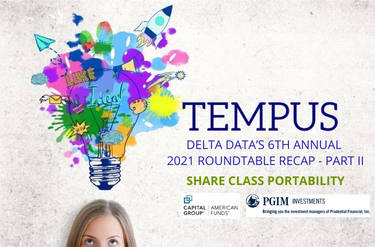Tate Rupprecht, PGIM Investments, and Brad Smith, American Funds discuss Share Class Portability
Recently Delta Data conducted its sixth annual customer roundtable, bringing in over 40 pundits and experts from the financial industry for a series of conversations covering various subjects from regulations of managing COVID. Participants include representatives from the top 10 US banks, top five US retirement recordkeepers, and top five US investment managers. In this blog post roundtable participants Tate Rupprecht, PGIM Investments, and Brad Smith, American Funds discuss share class portability, with some additional commentary from John Randall of ICI, who provided the insights for our first roundtable blog post.
Tate Rupprecht:
Share class portability is becoming a challenge at PGIM Investments. The mutual fund industry has numerous share classes. Dependent on the channel or the account type, not all our intermediaries are using or supporting all the share classes. When our clients want to move their mutual funds to a different provider, the ACATS are being rejected because the firm that they’re looking to transfer those assets to does not support that share class, and that reject creates back-office work.
What we wanted to talk about today is how we as an industry avoid negatively impacting our shareholders because if we do have a shareholder that’s holding an R6, a clean share, and the other firm will not accept it, the client must liquidate and then go into cash and then purchase at the other firm. That’s certainly not a good client experience.
Brad Smith:
Share classes exist to pass specific expenses to investors for different purposes. For example, we’ve got a whole suite of classes that we use specifically for retirement plans. We don’t make those available outside the retirement plan space, even though they may have a similar expense structure to a share class that’s offered on a retail basis, and so for us, it is about defining lines of business.
The retirement plan world, which is quickly becoming a fee-based world, everyone’s economic price point on how things work is different, and the portability factor comes into play knowing what works for one organization and doesn’t work for another. What are the potentials to simplify that process?
Brad Smith:
Our products are sold through financial professionals, and they’re there to make that decision. In some cases, they are influenced by the organizations they work for or leverage from a service perspective. Consequently, we’ve never felt like it’s our position to do so.
Tate Rupprecht:
The challenge is the different selling agreements that firms have and how they’re structured. A nice solution would be at least being able to move it over and not be able to purchase anymore, leaving the client with the ability to hold it.
Brad Smith:
When we talk about different intermediary constituencies, like the traditional bank trust space, or more broadly anyone acting truly in a custody capacity for what would be largely institutional customers, the response is, “I’ll hold anything.” It doesn’t matter to me. I’m willing to hold it.” It’s more of a question of ‘in that capacity does the asset manager let you hold it?
Think of mutual funds that have been created specifically for specific private bank clients. A few out there have been made for advisory programs, which by very nature are not portable. You leave the program; you’re no longer eligible to invest in the product that exists only if you’re part of that program. That creates an ever-growing challenge: there will always be a scenario where the client may have to sell. Do we think that we’ll be able to solve that in ways that involve conversions or protocols with the movement of assets as a fund industry?
Tate Rupprecht:
With the advent of so many data scientists John Randall talked about, we all know that we’re getting more and more data than we ever have. Certainly, regulators could start looking at all these share classes and potentially see that clients are liquidating, going back in when they’re switching intermediaries.
John Randall:
We do hear from the regulators periodically about the concept of asset portability. It has not historically gotten as much traction as other things, but it is a constant theme running underneath the surface. All it would take is one event or experience or enforcement action to bring it into stronger focus eventually.
Tate Rupprecht:
I do agree that we will be, as an industry slimming down the share classes. Once the clean shares came out; If this group is correct, there will only be a couple of share classes in the future.

